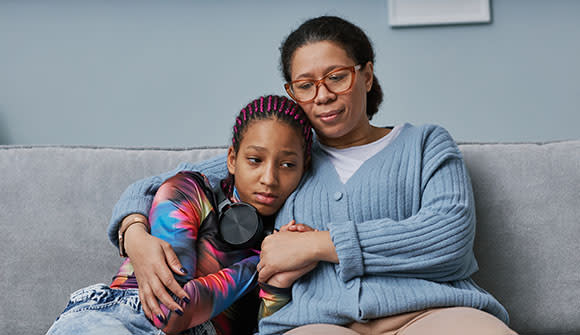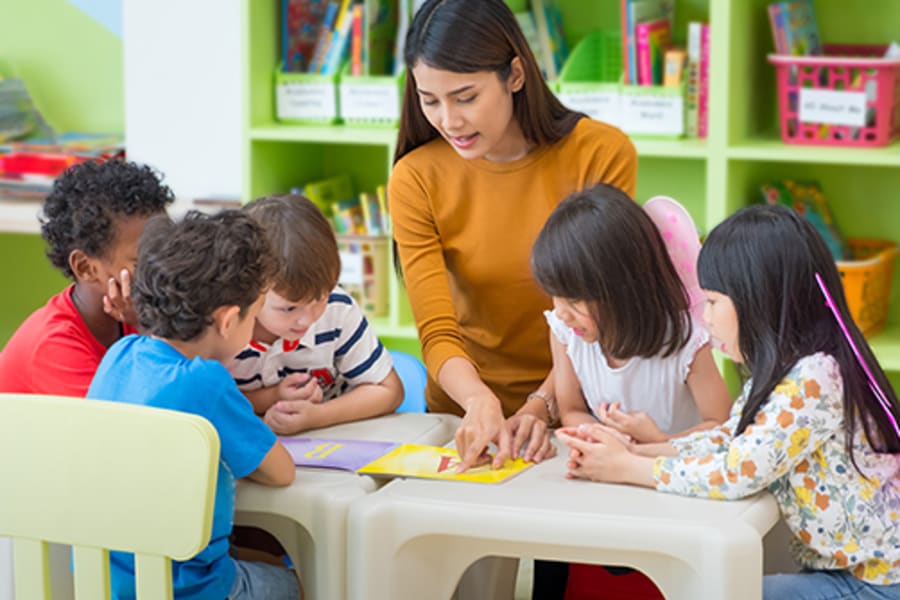Safe space
Tips to talk to children and teens about suicide.
Article Author: Juliette Allen
Article Date:

Some people think it’s a taboo topic. Others avoid even uttering the word aloud.
Suicide.
It’s hard to find the words to talk about such a serious subject among adults, and even more challenging to think about doing so with kids and teens. But it’s crucial: According to the National Institute of Mental Health, suicide is a leading cause of death among young people in the United States.
“While parents may tend to shy away from this conversation because it’s awkward or uncomfortable, it’s one of the most important talks to have with your child or teen,” said Francesca Varallo Sims, PsyD, director of Education and Training for Baptist Behavioral Health and Wolfson Children’s Behavioral Health. “By just acknowledging the topic, you’re opening the gate for children to confide in you about important things happening in their lives if and when they’re ready.”
Tackle the talk: How to start a conversation about suicide
The toughest part for parents often is figuring out where to begin. Dr. Varallo Sims recommended three simple steps:
- Chat often. Have frequent check-ins and conversations with your child about what’s going on in his or her life, both good and bad. These talks build the trust that’s necessary for a child to feel comfortable opening up about tough topics such as suicide.
- Be direct. As hard as it may feel, take a deep breath and ask, “Have you ever thought about hurting yourself or taking your own life?” Even if your child isn’t having thoughts of suicide, this question allows him or her to follow up with questions or concerns he or she may have on this or other topics.
- Watch for changes. Follow your gut. You know your child and if you’ve noticed a significant shift in mood or behavior, it could signal that he or she may be going through a hard time.
As for what you should be saying during these critical conversations, Dr. Varallo Sims said the best approach for parents is to be direct while using age-appropriate language and taking into account the child’s individual maturity level, personal mental health, sensitivity and potential exposure to the topic. She cautioned that nothing is “one size fits all,” but gave the following general guidelines for various age ranges:
- Elementary school: Keep information concise and limit detail. Emphasize the biological aspects of mental illness and that it’s a disease that can sometimes lead to death.
- Middle school: You can provide more detail about how there’s treatment for depression, correct myths about suicide, and specifically discuss warning signs.
- High school: Continue to dispel myths, validate that mental health issues impact everyone, and focus conversations on how your child (or others) would cope with suicidal thoughts, should they arise.
Warning signs of suicidal ideation
What exactly should parents be looking out for in their children?
According to Dr. Varallo Sims, common warning signs of suicidal ideation include:
- Changes in mood or personality
- Eating too much or too little
- Sleeping too much or too little
- Social isolation or withdrawal
- Feelings of hopelessness
- Loss of interest in things they previously enjoyed
“If you see one or more of these signs in your child, it’s a good idea to reach out to a professional for help,” Dr. Varallo Sims said. “Validate your child’s feelings and assure them you’re there for support. You’ll work together with the professional and your child to determine the right next steps for evaluation and treatment.”
Store firearms safely
One major thing parents can do to protect their children from potential self-harm is to ensure all guns are safely stored and can’t be accessed by kids or teens. According to the Centers for Disease Control and Prevention, firearm suicide rates are at record-high levels, and most people who use a gun in an attempt to take their life die as a result.
Safe Kids Northeast Florida, led by THE PLAYERS Center for Child Health at Wolfson Children’s Hospital, provided the following gun safety tips:
- Store unloaded guns in a locked location, out of reach and sight of children. Store ammunition in a separate area, also securely locked. Keep the keys and/or code hidden.
- Make sure all guns are equipped with child-resistant locks.
- Ask visitors who may have a gun with them to store it in a locked place while at your home.
- Never leave a gun on a nightstand, table or other place where a child can reach it.
- Teach children to never touch a gun and immediately tell an adult if they see one.
- Talk to relatives and other people you may visit about gun safety to ensure their guns are safely stored.
In September 2023, Wolfson Children’s Hospital received a $100,000 grant from Cardinal Health as part of the Preventing Youth Suicide National Collaborative. The grant will aid in training staff, furthering research and building on current Wolfson Children’s Behavioral Health services and crisis prevention initiatives.
If you or someone you know is in or at risk of a mental health crisis, call the Wolfson Children’s 24/7 Kids & Teens Helpline at 904.202.7900 or text LIFE to 741741 to connect with a trained mental health professional.
Sources: Centers for Disease Control and Prevention, National Institute of Mental Health



